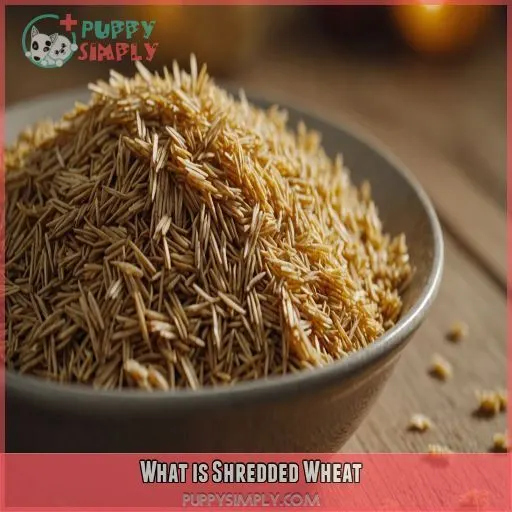This site is supported by our readers. We may earn a commission, at no cost to you, if you purchase through links.

The answer is yes, in moderation! Shredded wheat is a fiber-rich, easily digestible treat that can support your dog’s overall gut health and even alleviate pesky anal gland issues.
Just be sure to choose the plain, unflavored variety, as added sugars and flavorings can be a no-go for dogs.
As with any new food, introduce it slowly and in small amounts to avoid any, ahem, digestive drama.
Want to learn more about the benefits and risks?
Table Of Contents
- Key Takeaways
- Can Dogs Eat Shredded Wheat
- What is Shredded Wheat
- History of Shredded Wheat Cereal
- Nutritional Value of Shredded Wheat
- Difference Between Shredded Wheat and Whole Wheat
- Shredded Wheat as a Fiber Supplement
- Relieving Anal Gland Issues With Shredded Wheat
- Supporting Healthy Digestion in Dogs
- Wheat Allergies and Intolerances in Dogs
- Choking Hazards With Shredded Wheat
- Overfeeding and Weight Gain
- Can Dogs Eat Frosted Mini Wheats
- Dog Nutrition and Diet
- Common Canine Health Issues
- Human Foods and Pet Safety
- Pet Care and Advice
- Shredded Wheat and Dog Health
- Frequently Asked Questions (FAQs)
- Can I give my dog shredded wheat cereal?
- Can my dog eat mini wheats?
- What cereal can dogs eat?
- Why can’t dogs eat wheat?
- How much shredded wheat can I give my dog daily?
- Can shredded wheat cause digestive issues in puppies too?
- Is shredded wheat a good fiber supplement for dogs?
- Can dogs with food allergies eat plain shredded wheat?
- Can I mix shredded wheat with my dogs regular food?
- Conclusion
Key Takeaways
- You can give your furry friend shredded wheat in moderation – just be sure to choose the plain, unflavored variety to avoid any added sugars or flavorings that can be a no-go for dogs.
- Shredded wheat is a fiber-rich treat that can support your dog’s overall gut health and even alleviate pesky anal gland issues, but don’t forget to introduce it slowly and in small amounts to avoid any digestive drama.
- When adding shredded wheat to your dog’s diet, beware of potential allergies, choking hazards, and overfeeding risks, and always consult with your vet for personalized advice on the best fiber-rich foods for your furry friend.
- If you’re considering shredded wheat as a fiber supplement for your dog, remember that it’s not a one-size-fits-all solution – you’ll need to monitor your dog’s reaction, adjust the amount as needed, and balance it with a healthy, nutrient-rich diet to keep your pup happy and healthy.
Can Dogs Eat Shredded Wheat
You’re probably wondering if it’s safe to share your breakfast cereal with your furry friend, and the answer might surprise you. As it turns out, plain shredded wheat can be a helpful addition to your dog’s diet in small amounts, but there are some important factors to keep in mind.
Ingredients in Shredded Wheat
Let’s get down to business! Shredded wheat is made from 100% whole grain wheat, containing no additives or preservatives. A nutrient breakdown reveals it’s rich in fiber, with a whopping 6 grams per serving. This fiber composition makes it an excellent choice for supporting healthy digestion in dogs.
Types of Shredded Wheat Cereal
You’re probably wondering what types of shredded wheat cereal are out there. Well, you’ve got your classic Shredded Wheat, plus variations like bran flakes, frosted shredded wheat, and even whole grain options. Brands like Post and Kellogg’s offer a range of choices, so you can pick the one that’s paw-fect for your pup.
Benefits of Shredded Wheat for Dogs
You’re curious about the benefits of shredded wheat for your furry friend. Here are three ways it can help:
- Supports healthy digestion: Shredded wheat is high in dietary fiber, which can ease digestive issues and promote regular bowel movements.
- Relieves anal gland issues: A small amount of shredded wheat can help firm up stool and reduce anal gland problems.
- Satisfies canine fiber needs: As a healthy snack option, shredded wheat can contribute to your dog’s overall fiber intake, supporting a balanced digestive tract.
Risks of Feeding Shredded Wheat to Dogs
Now that we’ve explored the benefits, let’s talk risks. Feeding shredded wheat to dogs can cause allergic reactions, digestive problems, and nutrient imbalances. Intestinal blockage is also a concern, especially if your furry friend gobbles it down quickly. Be cautious of overfeeding risks, too, to avoid unwanted weight gain.
What is Shredded Wheat
You’re probably wondering what shredded wheat is and how it can impact your furry friend’s health. Let’s take a closer look at this popular breakfast cereal and explore its ingredients, nutritional value, and how it differs from whole wheat, as well as its potential benefits and risks for your dog.
History of Shredded Wheat Cereal
Shredded Wheat’s origins date back to 1893. Here are 4 key milestones in its history:
- 1893: Invented by Henry Perky, an American lawyer and entrepreneur.
- 1901: Perky founded the Cereal Machine Company to mass-produce Shredded Wheat.
- 1912: The company was renamed the Shredded Wheat Company.
- 1930s: Shredded Wheat became a popular breakfast cereal with its iconic biscuit-like shape.
Nutritional Value of Shredded Wheat
Let’s explore the nutritional value of shredded wheat together! You’ll be surprised by its simplicity and potential benefits for your pup.
Difference Between Shredded Wheat and Whole Wheat
When comparing shredded wheat to whole wheat, think of them as cousins – similar, but with distinct differences in processing and nutrition.
Shredded Wheat as a Fiber Supplement
Now that we’ve covered the difference between shredded wheat and whole wheat, let’s talk about using it as a fiber supplement.
Relieving Anal Gland Issues With Shredded Wheat
Let’s explore how shredded wheat can relieve anal gland issues in dogs, while considering the risk of wheat allergies and fiber alternatives.
Supporting Healthy Digestion in Dogs
By adding shredded wheat to your dog’s diet, you’re supporting healthy digestion, but don’t forget probiotics, digestive enzymes, and plenty water intake too.
Wheat Allergies and Intolerances in Dogs
You’re considering adding shredded wheat to your dog’s diet, but are wheat allergies and intolerances in dogs a concern for you?
Choking Hazards With Shredded Wheat
When adding shredded wheat to your dog’s diet, beware of choking hazards, especially if your furry friend gobbles food quickly.
Overfeeding and Weight Gain
To avoid overfeeding and weight gain in dogs, monitor their shredded wheat intake and balance it with a healthy, nutrient-rich diet.
- Limit shredded wheat servings to prevent canine obesity risks
- Pair shredded wheat with reduced-fat peanut butter dog treats for a balanced snack
- Add green beans to their meals for a low-calorie, nutrient-rich crunch
Can Dogs Eat Frosted Mini Wheats
You’re probably wondering if it’s okay to share your Frosted Mini Wheats with your furry friend.
Before you do, let’s take a closer look at the ingredients and potential risks involved.
While an occasional bite mightn’t harm your dog, regularly feeding them Frosted Mini Wheats can lead to a range of health issues.
From allergies and digestive problems to obesity and nutrient imbalances, these issues can have a significant impact on your dog’s health.
Ingredients in Frosted Mini Wheats
Examining Frosted Mini Wheats, let’s break down what’s inside. These bite-sized treats contain whole grain wheat, sugar, and corn syrup, along with artificial flavorings and preservatives like BHT. Some varieties even include artificial colors. While they may seem harmless, evaluating these ingredients is vital before sharing with your furry friend.
Dangers of Feeding Frosted Mini Wheats to Dogs
Feeding Frosted Mini Wheats to your dog can be a recipe for disaster.
Those tiny, sugar-coated wheat bits can cause canine sugar overload, digestive issues, and even choking hazards.
And let’s not forget about the potential for wheat allergies.
Overfeeding can lead to weight gain and a host of other problems, so it’s best to keep those Mini Wheats out of reach.
Healthier Alternatives to Frosted Mini Wheats
Looking for healthier alternatives to Frosted Mini Wheats for your furry friend? Consider oatmeal, a fiber-rich snack that’s easy on the digestive system. Sweet potatoes are another great option, packed with vitamins and minerals. Carrots and green beans make crunchy, nutritious snacks. These wolf-approved treats will keep your pup happy and healthy. Try them today!
Dog Nutrition and Diet
You’re probably wondering what’s the big deal about fiber in your dog’s diet, and how shredded wheat can help. As a dog owner, understanding the importance of fiber in maintaining your furry friend’s digestive health is vital, and we’re here to break it down for you in simple terms.
Importance of Fiber in a Dog’s Diet
Let’s get real – fiber is the unsung hero of canine nutrition. A high-fiber diet can work wonders for your dog’s gut health, supporting healthy stool formation and relieving constipation. Think of it like a warm hug for their insides! High-fiber treats can be a game-changer, but remember to always prioritize your pup’s unique needs and digestive quirks.
How to Add Shredded Wheat to a Dog’s Diet
Adding shredded wheat to your dog’s diet is simple. Start with small amounts (about 1-2 teaspoons per 10 pounds of body weight) to gauge their tolerance. Mix it with their regular meals or use as a topper. Be cautious if your dog has a wheat allergy. Monitor their stool quality and adjust the amount as needed to maintain a healthy balance.
Other Sources of Fiber for Dogs
Now that you know how to add shredded wheat to your dog’s diet, let’s explore other fiber-rich foods that can benefit your furry friend. Here are four options you can consider:
- Green beans: Low in calories, rich in fiber, and a great snack for dogs.
- Canned pumpkin: Supports healthy digestion and bowel movements.
- Psyllium husk: A natural fiber supplement that promotes regularity.
- Oatmeal: A fiber-rich food that can help soothe digestive issues.
Common Canine Health Issues
You’re probably wondering how shredded wheat fits into the bigger picture of your dog’s overall health, especially regarding common canine issues like anal gland problems and food allergies. Let’s explore how shredded wheat can help alleviate these issues, and what you need to know to keep your furry friend happy and healthy.
Anal Gland Issues in Dogs
Let’s get real about anal gland issues in dogs. You’re not alone – many pet owners deal with this stinky problem. Here’s a helpful table to break it down:
| Anal Gland Issues | Symptoms |
|---|---|
| Impaction | Straining during bowel movements |
| Infection | Pain, swelling, discharge |
| Abscess | Redness, swelling, pus |
| Cancer | Bleeding, weight loss |
| Rectal itching | Scooting, licking |
Adding shredded wheat to your dog’s diet can help with anal gland problems. Consult your vet for the best approach.
Food Allergies and Atopy in Dogs
If your furry friend is scratching, licking, or chewing excessively, they might be dealing with food allergies or atopy.
Symptoms can range from mild to severe, so you should definitely see your vet to get a proper diagnosis.
Treatment often involves a hypoallergenic diet, and in some cases, medication like Benadryl.
Early management and prevention can make a huge difference in your dog’s comfort and happiness.
How Shredded Wheat Can Help With Health Issues
Now that you know about food allergies and atopy in dogs, let’s explore how shredded wheat can help with common canine health issues. Adding small amounts of shredded wheat to your dog’s diet can help with fiber intake, supporting healthy digestion and relieving anal gland issues. However, be cautious of wheat allergies and monitor your dog’s weight to avoid overfeeding.
Human Foods and Pet Safety
You’re probably wondering what human foods are safe for your furry friend to munch on, and which ones to keep out of reach. Let’s explore the dos and don’ts of sharing your snacks with your dog, from shredded wheat to other tasty treats that might be tempting to share.
Safe Human Foods for Dogs
Sharing human food with your furry friend is something you need to be careful about. Here are 4 safe human foods for dogs:
- Green beans: A crunchy, low-calorie snack perfect for hot summer days.
- Sweet potatoes: Rich in fiber and vitamins, they make a nutritious treat.
- Carrots: A tasty way to support your dog’s dental health.
- Oatmeal: A soothing, easily digestible snack for sensitive tummies.
Toxic Human Foods for Dogs
Now that we’ve covered safe human foods for dogs, let’s talk about the toxic ones.
Chocolate, grapes, onions, macadamia nuts, and xylitol are all no-nos for your furry friend.
These foods can cause everything from vomiting to liver failure, so keep them out of reach.
Your dog’s safety is worth it – after all, you want to keep that tail wagging!
How to Introduce New Foods to a Dog’s Diet
When introducing new foods to your dog’s diet, it’s really important to go slow to avoid triggering new food allergies or sensitivities. Gradually add a small amount of the new food to their existing meals and observe their reaction. Monitor for any adverse symptoms, and adjust as needed. This cautious approach will help you make dietary changes with confidence.
Pet Care and Advice
As a dog owner, you’re probably no stranger to worrying about what human foods are safe for your furry friend to snack on – and shredded wheat is likely one of them. Luckily, with the right advice and regular veterinary check-ups, you can make informed decisions about your dog’s diet and keep them happy and healthy.
Expert Advice on Dog Nutrition and Health
Finding the right food for your furry friend can feel overwhelming.
You want the best for your dog, but with so many options and conflicting advice, it’s hard to know what to do.
That’s where expert advice comes in.
By consulting with a veterinarian or a qualified pet nutritionist, you can get personalized guidance on everything from dog food allergies to homemade dog treats.
They can help you understand raw dog food, dog food additives, and dog food brands, so you can make informed decisions that support your dog’s unique needs.
Importance of Regular Veterinary Check-Ups
Regular veterinary check-ups are really important for your furry friend’s health. You want to catch any potential issues before they become major problems. By scheduling regular check-ups, you’re taking proactive steps to prevent health problems and catch them early. This helps with health monitoring, disease prevention, and staying on top of vaccinations.
- Keep a health journal to track your dog’s vaccinations, medications, and test results.
- Don’t hesitate to ask your vet about any changes in your dog’s behavior, appetite, or stool quality.
- A healthy dog is a happy dog – and a happy you!
Shredded Wheat and Dog Health
You’re considering adding shredded wheat to your dog’s diet, but you want to know the potential drawbacks and what future research might hold. Let’s explore the surprising truth about shredded wheat and dog health, so you can make an informed decision for your furry friend.
Potential Drawbacks of Feeding Shredded Wheat to Dogs
Now that we’ve covered expert advice on dog nutrition and health, let’s talk about the not-so-sunny side of feeding shredded wheat to dogs.
Potential drawbacks include wheat allergies, which can lead to digestive issues and anal gland problems.
There’s also a choking risk if your furry friend gobbles it down too quickly.
And, let’s be real, overfeeding can happen if you’re not careful, which can lead to weight gain and other issues.
Future Research on Shredded Wheat and Dog Health
You’re probably wondering what the future holds for shredded wheat in canine health.
While we’ve explored its benefits and drawbacks, more research is needed to fully understand its long-term effects on dog digestion.
Scientists are just starting to scratch the surface of how shredded wheat impacts wheat allergies and fiber benefits in dogs.
Stay tuned for updates, and in the meantime, consult with your vet to determine the best fiber-rich foods for your furry friend.
Frequently Asked Questions (FAQs)
Can I give my dog shredded wheat cereal?
Let’s talk about your furry friend! Take Cooper, a pup with anal gland issues – a teaspoon of plain shredded wheat cereal with his meals can help. You can give your dog shredded wheat cereal in moderation, but beware of potential allergies.
Can my dog eat mini wheats?
You’re wondering if your furry friend can munch on mini wheats? Technically, yes, but it’s not a great idea due to potential allergies, digestive issues, and a lack of essential nutrients – opt for dog-specific treats instead!
What cereal can dogs eat?
You’re wondering what cereal is safe for your furry friend! Plain, unflavored shredded wheat or oatmeal are good options, but always introduce new foods slowly and in small amounts to prevent allergies or digestive issues.
Why can’t dogs eat wheat?
You’re wondering why dogs can’t eat wheat? Well, it’s because wheat is a common allergen that can cause rectal itching, inflammation, and anal gland issues in dogs, making it a no-go for many furry friends.
How much shredded wheat can I give my dog daily?
You can give your dog a small amount of shredded wheat daily, about 1/4 to 1/2 cup, as a fiber supplement to support their digestive health (Source). However, always consult with your vet for personalized advice.
Can shredded wheat cause digestive issues in puppies too?
Puppy parents, beware! Just like their adult counterparts, puppies can also experience digestive issues with shredded wheat, especially if they’re allergic to wheat or have sensitive tummies, so introduce it slowly and in small amounts.
Is shredded wheat a good fiber supplement for dogs?
You’re considering shredded wheat as a fiber supplement for your dog. In moderation, plain shredded wheat can be a good fiber source, helping with digestive issues like loose bowels and anal gland problems (Source).
Can dogs with food allergies eat plain shredded wheat?
Facing food allergies in your furry friend? Fret not! Plain shredded wheat can be a palatable possibility, but proceed with caution. Watch for wheat-related allergies, which can worsen symptoms, and consult your vet for personalized guidance.
Can I mix shredded wheat with my dogs regular food?
You can mix shredded wheat with your dog’s regular food, but start with small amounts to monitor their reaction. Plain, unflavored shredded wheat can help with digestive issues, but beware of potential allergies .
Conclusion
Yes, your furry friend can enjoy shredded wheat – in moderation!
Plain, unflavored shredded wheat is a fiber-rich treat that can support their gut health and even alleviate anal gland issues.
But remember, introducing new foods slowly is key to avoiding digestive drama.













